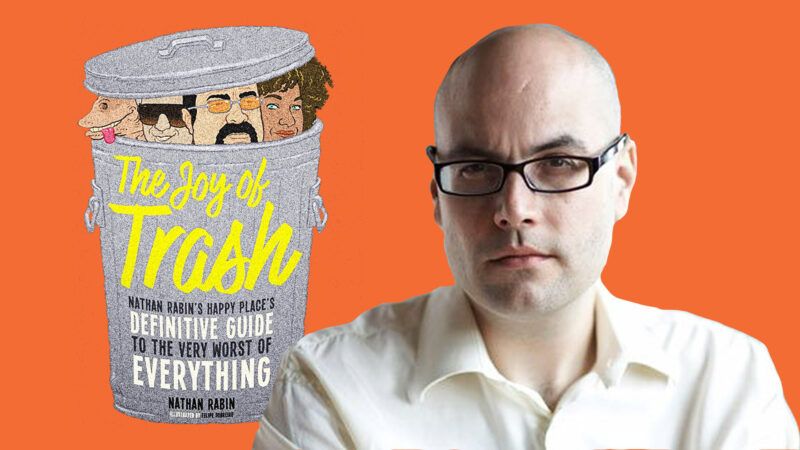Nathan Rabin: Why Gen X Is Super Media-Literate
The Joy of Trash author talks about how D.A.R.E., bad TV, Weird Al Yankovic, and 9/11 created a generation of ironic idealists.

"I am a professional rememberer," writes Nathan Rabin in The Joy of Trash. "It is my duty to remember not just for my own but for society."
Rabin is really taking one for the team here, especially since his new book accurately bills itself as the "definitive guide to the very worst of everything." Among the godawful things he explicates are Academy Award-winning actress Joan Crawford's bizzare and patently false 1971 lifestyle guide, My Way of Life; the misbegotten Brady Bunch Variety Hour, which improbably included numerous "water ballet" routines along with endless dad jokes; cocaine-addicted movie producer Robert Evans' 1981 court-ordered, star-studded, anti-drug TV special Get High on Yourself; and the entirety of billionaire Mike Bloomberg's 2020 presidential candidacy.
Rabin was the headwriter for The A.V. Club for two decades and the inventor of the popular-but-controversial term "Manic Pixie Dreamgirl" to describe a recurring film character who "exists solely in the fevered imaginations of sensitive writer-directors to teach broodingly soulful young men to embrace life and its infinite mysteries and adventures." He now runs his own website, Nathan Rabin's Happy Place, where he sifts through all manner of cultural detritus with endless wit and energy. He also co-hosts Travolta/Cage, a podcast about "the greatest actors in history."
The 45-year-old Rabin talks with Nick Gillespie about how his Gen X roots inform his appreciation for and critique of consumer culture. Kids his age, he explains, learned early on through D.A.R.E. and transparently phony TV shows that adults and other authorities were often lying. Gen X came of age in the 1990s, he says, a time when the belief that technology would make everything perfect was widespread, an optimism severely tested both by the bursting of the tech bubble and the 9/11 attacks. "Irony and satire and comedy," he says, "can bring light to a very dark situation, and it can be very cathartic being able to laugh at things that you're not supposed to laugh about or being able to laugh about things that are incredibly dark."
Rabin also discusses how musician Grimes, who had a widely covered relationship and two children with billionaire Elon Musk, is reclaiming—or perhaps satirizing—the manic pixie dream girl trope and why Weird Al Yankovic, the subject of a good deal of his writing, has had a career far longer than most of the people he parodies.
Watch the video version of this interview here.
- Today's sponsor is Better Help online therapy. Are you feeling stresssed out, run down, anxious, short-tempered? Take the time to take care of yourself and start talking to a licensed therapist who won't judge you but will listen and help you with your problems, whatever they are. Better Help is cheaper than most traditional forms of therapy and lets you talk with your therapist via chat, phone, or video—all within 48 hours of signing up and without the hassles of in-person appointments. Go here and get 10 percent off your first month.
- Attention, New York City metro-area listeners: Come out on Monday, April 4, to see a live taping of The Reason Interview With Nick Gillespie featuring Columbia neuroscientist Carl Hart, author of Drug Use for Grown-Ups: Chasing Liberty in the Land of Fear. Doors open at 6 p.m. at Caveat Theater and Bar, 21-A Clinton Street in Manhattan's Lower East Side. Tickets cost $10. Go to reason.com/events for details.

Show Comments (37)